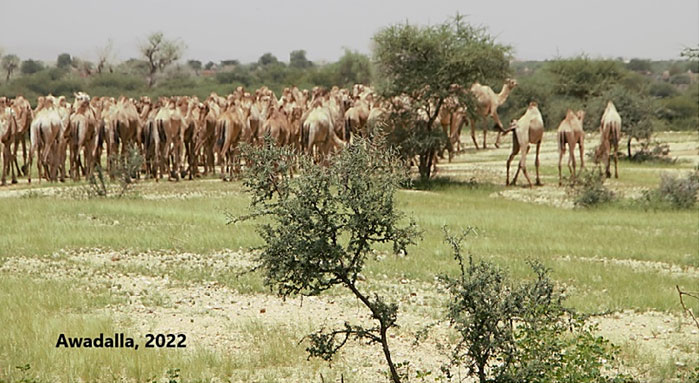Advance Certificate (Online) | P-001
Pastures, Pastoralism and Rangeland Governance
Course Director: Dr. Hasrat Arjjumend
MODULE 2: PASTORALISM AND TRANSHUMANCE
[Online 1 Week; 18 Study Hours]
Instructors: Prof. Abdelaziz Karamalla Gaiballa and Dr. Evan F. Griffith
Field Practitioners: Celia Alba Martinez Aragon and Dr. Hussein Tadicha

Dear Students,
We welcome you to the Module 2. The contents of this module complement to and build on the information learned from Module 1 [Pastures and Grasslands]. This module focuses on “Pastoralism and Transhumance”, and consists of 6 units [Online 1 Week; 18 Study Hours] as under:
- Unit 2.1: Pastoralism and Transhumance
- Unit 2.2: Pastoralism and Logic of Mobility
- Unit 2.3: Pastoralism and Development: A Critical Debate
- Unit 2.4: Traveling Through Landscapes
- Unit 2.5: Traditional Ecological Knowledge of Herders
- Unit 2.6: Climate Change Adaptation Measures by Local Communities
We hope you will find it interesting to attend this Module. The module has been designed to illustrate facts, information and issues related to Pastoralism and Transhumance in a form of research results, case studies and/or issues, in a manner to enable you to look at pastoralism from different angles for better understanding. In addition, the module is focusing on realizing the importance of pastoralism as a land use system, that is facing number of challenges and surrounded by number of misconceptions and obstacles, that are hindering its development. Pastoralism is almost practiced widely in the world, representing a mean of livelihood for big numbers of people. In spite of its environmental, social and economic importance at international and national levels, pastoralism development and sustainability are facing number of challenges.
Studying and learning about pastoralism becomes an issue of growing importance, not only representing a narrow interest but at local, regional and global levels. The growing importance is attributed to the global existence of pastoralism as a land use system interfering along social, economic and environmental dimensions that are intersecting with concerns like climate change, food security, peaceful coexistence and environmental safety. This reality imposed involvement of interdisciplinary efforts in addressing pastoralism issues.
The module is also covering some of the efforts that are aiming at supporting better understanding, sensitization of decision makers and addressing misconceptions about pastoralism.
TABLE OF CONTENTS
Unit 2.1: Pastoralism and Transhumance
2.1.1 Pastoralism
2.1.2 Transhumance
Unit 2.2: Pastoralism and Logic of Mobility
2.2.1 Understanding the Mobility
2.2.2 Logic of Mobility
Unit 2.3: Pastoralism and Development: A Critical Debate
2.3.1 Views on Pastoralism in Development Context
2.3.2 Future of Pastoralism
Unit 2.4: Traveling through Landscapes
2.4.1 Understanding Landscape Concept
2.4.2 Pastoralism and Landscape
Unit 2.5: Traditional Ecological Knowledge of Herders
2.5.1 Introducing Traditional Ecological Knowledge and Pastoralism
2.5.2. Pastoral Traditional Ecological Knowledge in Action
2.5.3. Traditional Ecological Knowledge under Threat
Unit 2.6: Climate Change Adaptation Measures by Local Communities
2.6.1. Vulnerability and Resilience
2.6.2. Lessons from Pastoralists in Climate Resilience
2.6.3. Conclusion






